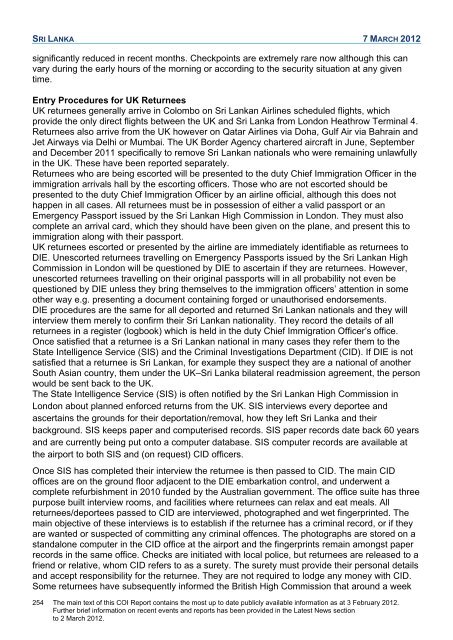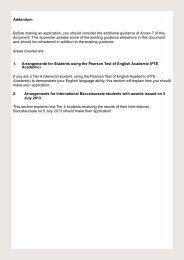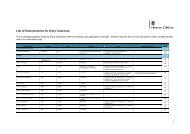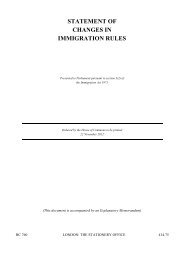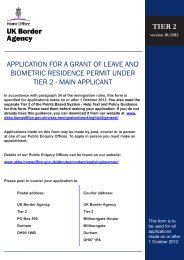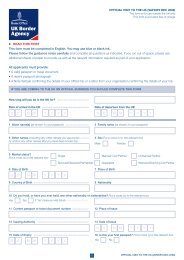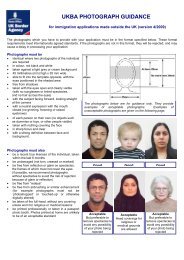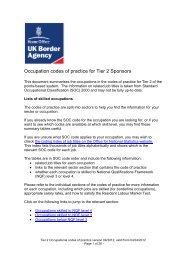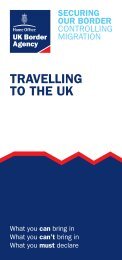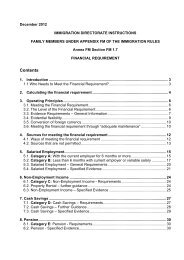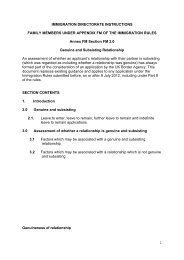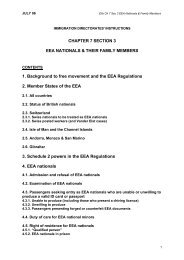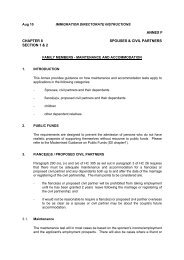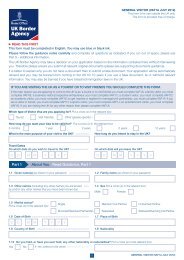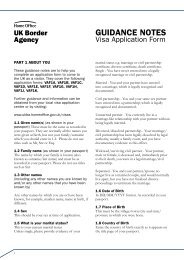COI Report March 2012 - UK Border Agency - Home Office
COI Report March 2012 - UK Border Agency - Home Office
COI Report March 2012 - UK Border Agency - Home Office
Create successful ePaper yourself
Turn your PDF publications into a flip-book with our unique Google optimized e-Paper software.
SRI LANKA 7 MARCH <strong>2012</strong><br />
significantly reduced in recent months. Checkpoints are extremely rare now although this can<br />
vary during the early hours of the morning or according to the security situation at any given<br />
time.<br />
Entry Procedures for <strong>UK</strong> Returnees<br />
<strong>UK</strong> returnees generally arrive in Colombo on Sri Lankan Airlines scheduled flights, which<br />
provide the only direct flights between the <strong>UK</strong> and Sri Lanka from London Heathrow Terminal 4.<br />
Returnees also arrive from the <strong>UK</strong> however on Qatar Airlines via Doha, Gulf Air via Bahrain and<br />
Jet Airways via Delhi or Mumbai. The <strong>UK</strong> <strong>Border</strong> <strong>Agency</strong> chartered aircraft in June, September<br />
and December 2011 specifically to remove Sri Lankan nationals who were remaining unlawfully<br />
in the <strong>UK</strong>. These have been reported separately.<br />
Returnees who are being escorted will be presented to the duty Chief Immigration <strong>Office</strong>r in the<br />
immigration arrivals hall by the escorting officers. Those who are not escorted should be<br />
presented to the duty Chief Immigration <strong>Office</strong>r by an airline official, although this does not<br />
happen in all cases. All returnees must be in possession of either a valid passport or an<br />
Emergency Passport issued by the Sri Lankan High Commission in London. They must also<br />
complete an arrival card, which they should have been given on the plane, and present this to<br />
immigration along with their passport.<br />
<strong>UK</strong> returnees escorted or presented by the airline are immediately identifiable as returnees to<br />
DIE. Unescorted returnees travelling on Emergency Passports issued by the Sri Lankan High<br />
Commission in London will be questioned by DIE to ascertain if they are returnees. However,<br />
unescorted returnees travelling on their original passports will in all probability not even be<br />
questioned by DIE unless they bring themselves to the immigration officers‘ attention in some<br />
other way e.g. presenting a document containing forged or unauthorised endorsements.<br />
DIE procedures are the same for all deported and returned Sri Lankan nationals and they will<br />
interview them merely to confirm their Sri Lankan nationality. They record the details of all<br />
returnees in a register (logbook) which is held in the duty Chief Immigration <strong>Office</strong>r‘s office.<br />
Once satisfied that a returnee is a Sri Lankan national in many cases they refer them to the<br />
State Intelligence Service (SIS) and the Criminal Investigations Department (CID). If DIE is not<br />
satisfied that a returnee is Sri Lankan, for example they suspect they are a national of another<br />
South Asian country, them under the <strong>UK</strong>–Sri Lanka bilateral readmission agreement, the person<br />
would be sent back to the <strong>UK</strong>.<br />
The State Intelligence Service (SIS) is often notified by the Sri Lankan High Commission in<br />
London about planned enforced returns from the <strong>UK</strong>. SIS interviews every deportee and<br />
ascertains the grounds for their deportation/removal, how they left Sri Lanka and their<br />
background. SIS keeps paper and computerised records. SIS paper records date back 60 years<br />
and are currently being put onto a computer database. SIS computer records are available at<br />
the airport to both SIS and (on request) CID officers.<br />
Once SIS has completed their interview the returnee is then passed to CID. The main CID<br />
offices are on the ground floor adjacent to the DIE embarkation control, and underwent a<br />
complete refurbishment in 2010 funded by the Australian government. The office suite has three<br />
purpose built interview rooms, and facilities where returnees can relax and eat meals. All<br />
returnees/deportees passed to CID are interviewed, photographed and wet fingerprinted. The<br />
main objective of these interviews is to establish if the returnee has a criminal record, or if they<br />
are wanted or suspected of committing any criminal offences. The photographs are stored on a<br />
standalone computer in the CID office at the airport and the fingerprints remain amongst paper<br />
records in the same office. Checks are initiated with local police, but returnees are released to a<br />
friend or relative, whom CID refers to as a surety. The surety must provide their personal details<br />
and accept responsibility for the returnee. They are not required to lodge any money with CID.<br />
Some returnees have subsequently informed the British High Commission that around a week<br />
254 The main text of this <strong>COI</strong> <strong>Report</strong> contains the most up to date publicly available information as at 3 February <strong>2012</strong>.<br />
Further brief information on recent events and reports has been provided in the Latest News section<br />
to 2 <strong>March</strong> <strong>2012</strong>.


